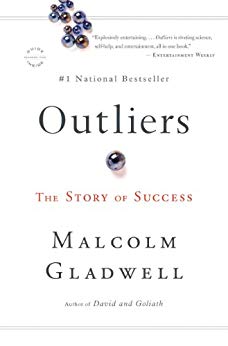

This article is an excerpt from the Shortform summary of "Outliers" by Malcolm Gladwell. Shortform has the world's best summaries of books you should be reading.
Like this article? Sign up for a free trial here .
Who is Joe Flom, and what three lessons does Malcolm Gladwell teach about him in Outliers? Learn the secrets to Joe Flom’s success.
Who is Joe Flom?
Joe Flom, the last living named partner of one of the largest and most powerful law firms in the world (Skadden, Arps, Slate, Meagher, and Flom), grew up in poverty in Brooklyn during the Depression. His parents were Jewish immigrants from Eastern Europe who worked in the garment industry.
After being accepted at the prestigious Townsend Harris public high school, Joe Flom pushed a hand truck in the garment district for two years and went to night school. With only a piecemeal college education, he applied and was accepted to Harvard Law School.
Still, he was an awkward kid, and near the end of hiring season he was one of only two of his Harvard class not to have a job lined up. With little choice, he took a chance on a new firm that had no clients. That firm eventually grew to employ 2,000 attorneys and earn over $1 billion a year.
Let’s look at the hidden opportunities in this rags-to-riches story. Although it may appear that Joe Flom got by on his brains and ambition alone, we know by now that no man is an island. We are the products of our environments.
Opportunity-in-Disguise: Being Jewish
Initially, Flom’s Culture and Ancestry were Disadvantages.
In the 1940’s and 50’s, the most elite law firms were very particular about accepting the “right” types of lawyers and clients. The right type was Nordic and clean-cut, was born to the right family, and was well connected. The right lawyer was not Jewish.
Joe Flom’s being Jewish excluded him from working for New York’s most elite law firms. He had to take what he could get, and this meant working with firms who took whatever work they could get.
Elite, “white-shoe” firms (named for the preferred footwear of the country club) handled the taxes and legal work of issuing stocks and bonds for big corporations. They didn’t take on litigation cases (law suits) which were considered low-class and sleazy. Lawsuits also weren’t common at the time—major corporations didn’t sue each other and there weren’t many hostile corporate takeovers. Elite firms had no reason to take on this “ungentlemanly” work.
Excluded from elite firms, Jewish lawyers accepted the litigation work that traditional white-shoe firms rejected. They also handled “proxy fights,” the legal side of a hostile takeover, when one investor or company tries to take over another company without its consent. Consequently, Jewish lawyers developed a unique skill set that would later become sought after. Joseph Flom’s specialty was proxy fights.
A Few Decades Later, Flom’s Culture and Ancestry Became Advantages
In the 1970’s, the tide changed. Borrowing money became easier and markets became internationalized. Federal regulations relaxed. Consequently, investors become more aggressive, and corporate takeovers increased dramatically.
As corporate takeover became more common, the legal work associated with them became less taboo. Suddenly, everyone needed litigation lawyers. Jewish lawyers had already accumulated their 10,000 hours of litigation and proxy-fight practice. For someone like Joseph Flom, the timing was perfect. He was one of the few experts in a sought-after specialization.
Joseph Flom was discriminated against because he was Jewish. However, if he hadn’t been Jewish, and consequently discriminated against, he wouldn’t have gained the expertise that made him, and other Jewish lawyers, so enormously successful.
Opportunity-in-Disguise: Being Born During the Depression
Just as many uber-successful computer programmers were born in the 1950’s, many successful Jewish lawyers were born in the 1930’s. These lawyers had opportunities that those born a decade before or after didn’t have. Successful individuals are often “born at the right time.”
Jewish lawyers belonging to the generation before Joseph Flom struggled through the Great Depression, usually as solo practitioners. Many earned less than the minimum subsistence levels for American families. For lawyers born before the 1930’s, being Jewish was not an advantage.
For example, Maurice Janklow was a Jewish lawyer born in 1902. He attended Brooklyn Law School, set up his own practice, and married the daughter of a prominent Talmudist. He moved to Queens and took over a writing-paper business that appeared destined for success. Success never arrived.
However, Janklow’s son, Morton Janklow (born in 1930), because an extraordinarily successful corporate lawyer and literary agent.
The 1930’s was a “demographic trough,” or small generation, due to the fact that many families couldn’t afford to increase the size of their families during the Depression. In 1915, 29.5 babies were born for every thousand people. In 1935, that number dropped to 18.7 babies and in 1950 it jumped up to 24.1.
We assume that being born during the Depression would be a disadvantage, but being born in a demographic trough has its advantages: Those born in the 1930’s experienced benefits such as small class sizes and new schools built for the previous, larger generation. They were instructed by excellent teachers who would have been professors if not for the Great Depression. University tuition was lower, presumably to attract more students, and employers were always looking to hire.
Because his generation was small, Joseph Flom’s opportunities were more numerous and the competition for jobs less fierce. Being born at a time when relatively few others were born was an advantage.
Opportunity-in-Disguise: Being Born to Parents in the Garment Industry
Joseph Flom’s parents were both garment workers (his father sewed women’s shoulder pads; his mother did appliqué work by hand). They were extremely poor, moving from apartment to apartment to take advantage of the then-customary first month of free rent.
We tend to assume growing up in poverty is an automatic disadvantage. However, the nature of the Joe Floms’ garment work taught them lessons they passed on to their son. His parents’ trade was yet another opportunity for Joe Flom.
The Three Lessons of the Garment Industry
From the late 19th century until the mid 20th century, the garment trade was the largest industry in New York City.
This was lucky for Jewish immigrants arriving in the 1890’s (the generation of Joe Flom’s parents). In Europe, Jews were forbidden to own land, so they lived in cities and worked in various trade professions, most commonly the garment trade. When they got to New York, their specialized skill set was greatly needed. Again, being discriminated against was, in a way, an advantage. Jews took the jobs that others wouldn’t. They were then in a position to be experts when the neglected skills became in-demand.
Working in the garment industry taught Jewish immigrants three components of meaningful work: autonomy, complexity, and the relationship between effort and reward. They brought these lessons home to their children, who used the lessons’ wisdom to help them become successful doctors and lawyers.
———End of Preview———

Like what you just read? Read the rest of the world's best summary of "Outliers" at Shortform . Learn the book's critical concepts in 20 minutes or less .
Here's what you'll find in our full Outliers summary :
- What makes some people outliers, and most others not
- Why some genius outliers end up failing in life
- Why Asians are good at math, and other curiosities of culture






